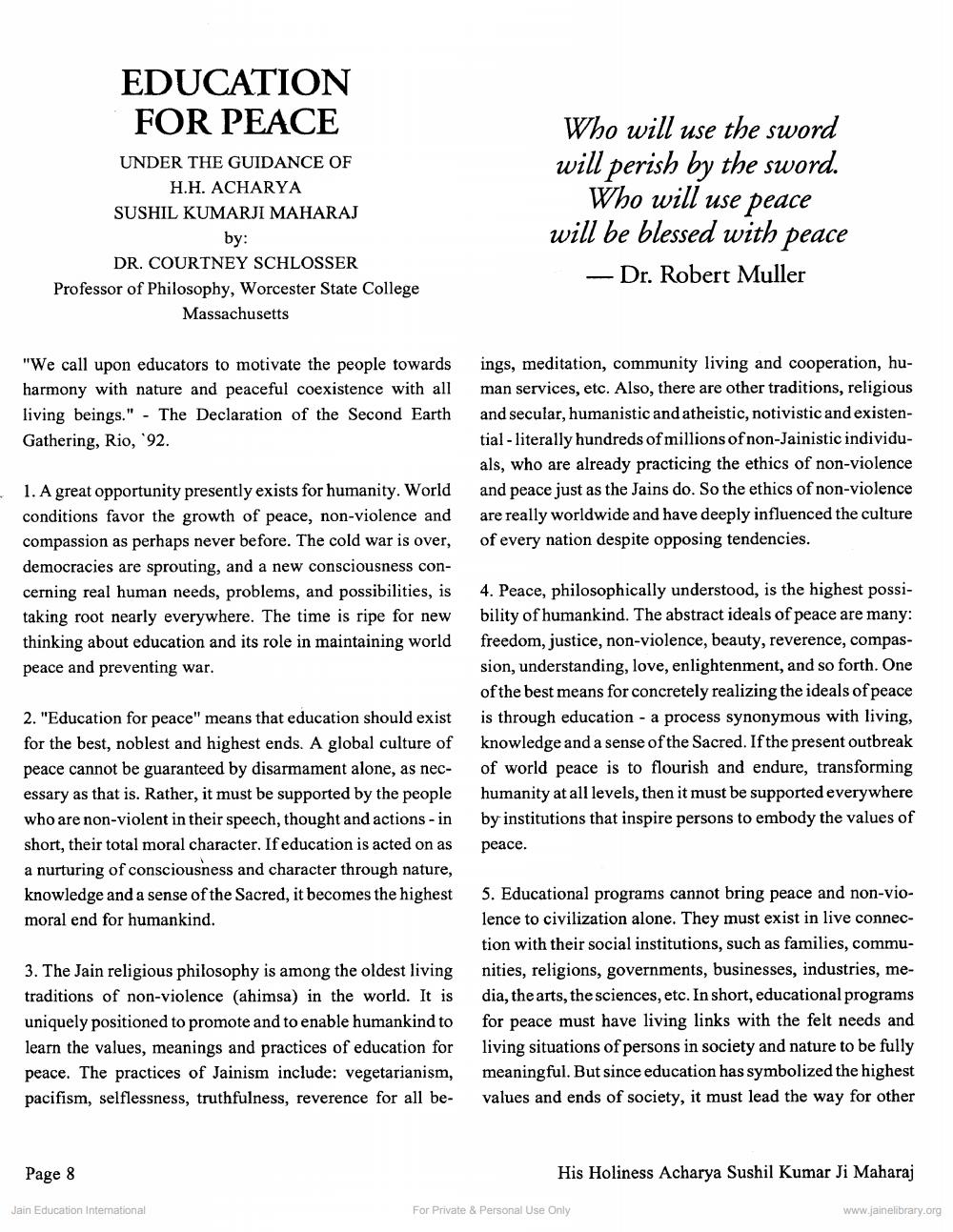________________
EDUCATION FOR PEACE
UNDER THE GUIDANCE OF H.H. ACHARYA
SUSHIL KUMARJI MAHARAJ by:
DR. COURTNEY SCHLOSSER
Professor of Philosophy, Worcester State College
"We call upon educators to motivate the people towards harmony with nature and peaceful coexistence with all living beings." The Declaration of the Second Earth Gathering, Rio, '92.
Massachusetts
1. A great opportunity presently exists for humanity. World conditions favor the growth of peace, non-violence and compassion as perhaps never before. The cold war is over, democracies are sprouting, and a new consciousness concerning real human needs, problems, and possibilities, is taking root nearly everywhere. The time is ripe for new thinking about education and its role in maintaining world peace and preventing war.
Page 8
2. "Education for peace" means that education should exist for the best, noblest and highest ends. A global culture of peace cannot be guaranteed by disarmament alone, as necessary as that is. Rather, it must be supported by the people who are non-violent in their speech, thought and actions - in short, their total moral character. If education is acted on as a nurturing of consciousness and character through nature, knowledge and a sense of the Sacred, it becomes the highest moral end for humankind.
3. The Jain religious philosophy is among the oldest living traditions of non-violence (ahimsa) in the world. It is uniquely positioned to promote and to enable humankind to learn the values, meanings and practices of education for peace. The practices of Jainism include: vegetarianism, pacifism, selflessness, truthfulness, reverence for all be
Jain Education International
Who will use the sword will perish by the sword. Who will use peace will be blessed with peace
Dr. Robert Muller
ings, meditation, community living and cooperation, human services, etc. Also, there are other traditions, religious and secular, humanistic and atheistic, notivistic and existential - literally hundreds of millions of non-Jainistic individuals, who are already practicing the ethics of non-violence and peace just as the Jains do. So the ethics of non-violence are really worldwide and have deeply influenced the culture of every nation despite opposing tendencies.
4. Peace, philosophically understood, is the highest possibility of humankind. The abstract ideals of peace are many: freedom, justice, non-violence, beauty, reverence, compassion, understanding, love, enlightenment, and so forth. One of the best means for concretely realizing the ideals of peace is through education - a process synonymous with living, knowledge and a sense of the Sacred. If the present outbreak of world peace is to flourish and endure, transforming humanity at all levels, then it must be supported everywhere by institutions that inspire persons to embody the values of peace.
5. Educational programs cannot bring peace and non-violence to civilization alone. They must exist in live connection with their social institutions, such as families, communities, religions, governments, businesses, industries, media, the arts, the sciences, etc. In short, educational programs for peace must have living links with the felt needs and living situations of persons in society and nature to be fully meaningful. But since education has symbolized the highest values and ends of society, it must lead the way for other
His Holiness Acharya Sushil Kumar Ji Maharaj
For Private & Personal Use Only
www.jainelibrary.org




